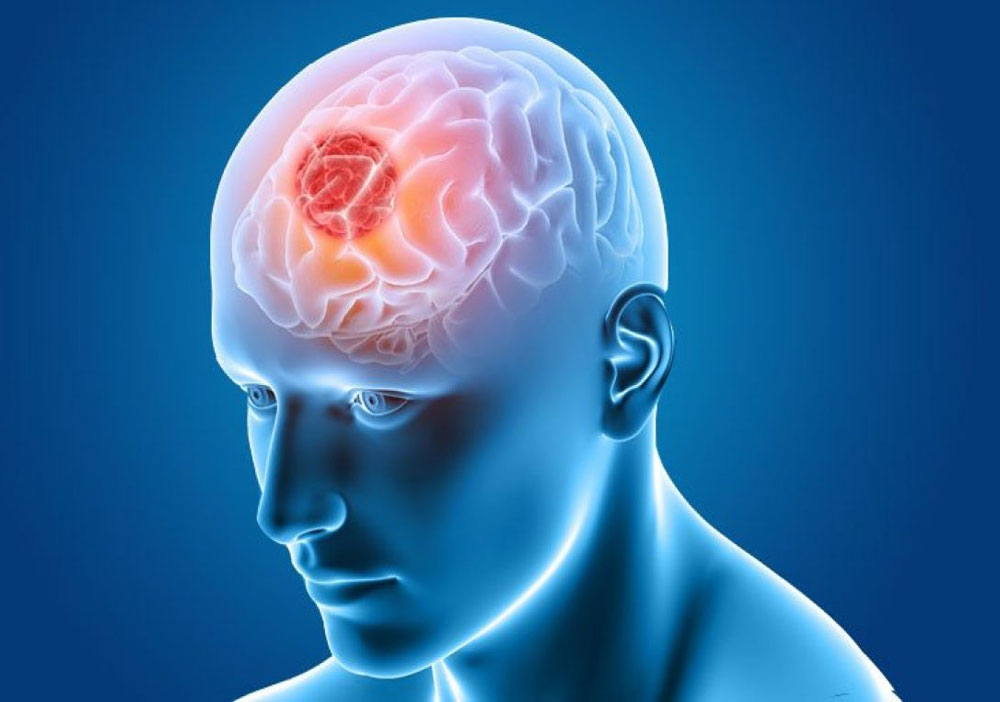Brain Tumours
Brain tumor is a mass of abnormal cells that grows in the brain or adjacent to it. Structures adjacent to the brain are its covering membranes, two glands one sits at the base in the front beteen the two nerves for vision and major blood vessels supplying the brain. It is called pituitary gland. The other is in the middle and deep inside the the brain and is called pineal gland. Other structures in the nearby location are the nerves arising from or entering into it. In addition, tumours arising in other body organs may send satellites into the brain which is termed as metastasis.
Brain tumours are either cancers or they can be innocent or benign. Majority of the tumours arising in the brain tissue are cancerous where as those arising in the adjacent structures are mostly benign. Brain tumours vary in their size at the time of diagnosis. Those involving structures or brain parts which have a very active role in body function are detected right away. Others in less active brain areas may reach quite a large size before they are diagnosed

TYPES
There are several types of brain tumours depending upon the cell of origin which is responsible for its formation. The type can definitely be determined once the tumour tissue has been subjected to special lab tests. Brain tumours are both of cancerous and non- cancerous type. Benign brain tumours grow slowly while the malignant ones have a rapid growth.
Types of brain tumours include the following
Parenchymal brain tumours
Gliomas are the commonest brain tumours originating from brain parenchyma or tissue. They arise from glial cells which surround and support nerve cells in the brain tissue. There are different types of gliomas and they include, astrocytoma, glioblastoma, oligodendroglioma and ependymoma. Glioblastoma is the commonest malignant brain tumor
Choroid plexuses tumours
They arise from a specialised vascular tissue which produces the fluid that surrounds the brain and spinal cord to cushion it against the external forces. These tumours are located in the brain cavities producing this water. These cavities are called ventricles. Choroid plexuses tumours can be benign and malignant and are more commonly seen in children.
Embryonal tumours
These tumours arise from the left over cells from fetal development. Embryonal brain tumours are malignant and are mostly found in infants and children. The commonest type of this brain tumor in children is medulloblastoma. It is located in the back and lower side of brain called cerebellum
Germ cell tumours
Germ cell tumours arise from the reproductive cells that are destined to become the egg cells and sperms. Germ cells are to be found in ovaries and testicles but sometimes they lodge in other organs including brain. Characteristically they are located in the centre of brain near the pineal gland. They are mostly benign and are found in children commonly
Pineal tumours
They arise in or around the pineal gland which has a central location in the brain. Sleep harmone melatonin is produced by this gland. Pineal tumours can be both benign(pineocytoma) and malignant (pineoblastoma).
Piuitary tumours
Brain tumours can arise from and around the pituitary gland. This gland is located near the base of brain in the front between the nerves for vision. Majority of these tumours are benign. They are called pituitary tumours when they arise from the gland and craniopharyngioma when the origin is near the gland
Meningiomas
They arise from the cells of brain membrane called arachnoid cap cells. They occur in the brain and spinal cord. Majority of these tumours are benign but can be malignant. They are the commonest benign brain tumours.
Nerve tumours
These tumours arise from with in the nerve or it’s covering. Commonest type of nerve tumor in the brain is acoustic neuroma which arises from the nerve which is responsible for keeping the balance and is also called vestibular schwanomma
SYMPTOMS
The signs and symptoms of brain tumours depend on their location and size and speed of their growth indicative of their charcater. The general signs and symptoms produced by brain tumours may be non-specific but mostly point towards the brain or it’s surrounding structures as the source of their production
- headaches, more specifically morning headaches
- persistent refractory to medication headaches associated with vomiting
- visual disturbances like blurring or double vision especially when associated with headache
- difficulty in swallowing and drinking
- nausea and vomiting
- decreased strength in one half or limb of body
- seizures especially focal fits
- difficulty in maintaining balance or gait disturbance
- speech difficulties
- exhaustion
- memory disturbances
- confusion
- personality and behaviour changes
- dizziness and vertigo
- disturbance or cessation of periods in young females
- loss of taste and smell
Rapidly progressing symptoms are indicative of a cancerous tumour whereas benign or non-cancerous tumour’s symptoms are slow to evolve
Patients with these symptoms should seek an appointment at the earliest with a doctor expert in dealing with neurological diseases
